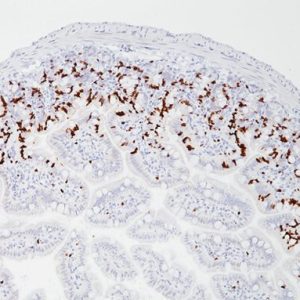Description
The excision repair cross-complementation group 1 (ERCC1) gene encodes a protein required for nucleotide excision repair and inter-strand crosslink repair of DNA (1). While DNA-damaging chemotherapeutic drugs like cisplatin are commonly used for non-small cell lung carcinoma and other late-stage tumors, these drugs have a high degree of resistance and severe side effects (1,3). Platinum chemotherapy drug resistance has been linked to elevated levels of ERCC1-XPF nuclease, therefore making ERCC1 a potential predictive diagnostic biomarker (2,3). ERCC1 expression may have prognostic value in lung, colorectal, head and neck, bladder, breast and cervical cancers (1-7).
Although clone 8F1 has traditionally been used in immunohistochemistry to detect ERCC1 expression, 8F1 has been found to cross-react with PCYT1A, an unrelated nuclear membrane protein. Clone 4F9 does not show this cross-reaction, providing superior specificity for ERCC1 expression (2-4).
SPECIFICATIONS
Specifications
| INTENDED USE | IVD |
|---|---|
| FORMAT | Concentrate |
| VOLUME | 0.1 ml, 0.5 ml |
| SOURCE | Mouse Monoclonal |
| CLONE | 4F9 |
| ISOTYPE | IgG1 |
| ANTIGEN | Protein expressed in 293T cell transfected with human ERCC1 expression vector |
| LOCALIZATION | Nuclear, cytoplasmic |
| POSITIVE CONTROL | Prostate or prostate cancer |
DATASHEETS & SDS
REFERENCES
1. Bhagwat NR, et al. Immunodetection of DNA repair endonuclease ERCC1-XPF in human tissue. Cancer Res. 2009 Sep 1;69(17):6831-8.
2. Ma D, et al. Using protein microarray technology to screen anti-ERCC1 monoclonal antibodies for specificity and applications in pathology. BMC Biotechnol. 2012 Nov 21;12:88.
3. Smith DH, et al. Measuring ERCC1 protein expression in cancer specimens: validation of a novel antibody. Sci Rep. 2014 Mar 7;4:4313.
4. Bauman JE, et al. ERCC1 is a prognostic biomarker in locally advanced head and neck cancer: results from a randomised, phase II trial. Br J Cancer. 2013 Oct 15;109 (8):2096-105.
5. Ozcan MF, et al. Low ERCC1 expression is associated with prolonged survival in patients with bladder cancer receiving platinum-based neoadjuvant chemotherapy. Urol Oncol. 2013 Nov;31(8):1709-15.
6. Palomba G, et al. ERCC1 polymorphisms as prognostic markers in T4 breast cancer patients treated with platinum-based chemotherapy. J Transl Med. 2014 Sep 25;12:272.
7. Center for Disease Control Manual. Guide: Safety Management, NO. CDC-22, Atlanta, GA. April 30, 1976 “Decontamination of Laboratory Sink Drains to Remove Azide Salts.”
8. Clinical and Laboratory Standards Institute (CLSI). Protection of Laboratory Workers from Occupationally Acquired Infections; Approved Guideline-Fourth Edition CLSI document M29-A4 Wayne, PA 2014.







Reviews
There are no reviews yet.